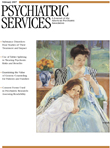February 2007: This Month's Highlights
Focus on Substance Use Disorders
Four studies in this month's issue focus on substance use disorders. Dennis McCarty, Ph.D., and colleagues surveyed 3,698 direct care workers in substance abuse treatment programs to assess attitudes toward use of evidence-based practices. The survey found only modest support for several such interventions, including the use of medications and contingency management ( Original article: page 181 ). In a commentary on the survey's implications for the science-to-services gap, Henrick Harwood notes the importance of finding ways to address human factors, such as the "grudging acceptance" of new practices among many workers ( Original article: page 191 ). Li-Tzy Wu, Sc.D., and colleagues analyzed data for more than 11,300 young adults in the 2002 National Survey on Drug Use and Health. Rates of alcohol use disorders were similar for full-time college students and for nonstudents—about 20%. Lower rates were found for part-time college students (15%) and respondents still in high school (12%). Less than 10% of any group used treatment services, and college students were the least likely to receive treatment (4%) ( Original article: page 192 ). Stephen W. Tracy, M.A., and a research team from the Veterans Affairs (VA) health system report that the capacity to detect and treat substance use disorders in VA psychiatric and primary care settings has not grown to keep pace with a 50% reduction in VA specialty substance abuse treatment programs ( Original article: page 266 ). In a sample of nearly 200 Medicaid recipients with co-occurring psychotic and substance use disorders, Carlos T. Jackson, Ph.D., and colleagues found a 12-year mortality rate of 41% among those with evidence of diabetes, compared with a 10% rate among those without diabetes ( Original article: page 270 ).
Two Studies of Medication Adherence
Even though tablet splitting can greatly reduce medication costs, some clinicians question whether patients with psychosis can follow splitting instructions. After a region of the Veterans Affairs health system recommended this approach for risperidone prescribing, Ellen M. Weissman, M.D., M.P.H., and Cornelia Dellenbaugh, M.P.H., retrospectively investigated adherence among nearly 2,000 patients. The results provided some assurance that the practice does not lead to poor clinical outcomes, although a subgroup of patients initially experienced problems with crumbled tablets and some needed extra clinic appointments ( Original article: page 201 ). In Taking Issue, Peter Weiden, M.D., wonders whether such pill-splitting initiatives will ultimately have adverse effects on adherence by steering pharmaceutical companies away from flat pricing ( Original article: page 163 ). In another study of adherence, by John D. Piette, Ph.D., and colleagues, veterans with schizophrenia and comorbid illnesses who were taking several medications at once—for schizophrenia, for diabetes, and for hypertension—were found to have significant differences in adherence across medications ( Original article: page 207 ).
Readability of Consent Forms
According to a recent study, 70% of adults with self-reported mental health problems are either functionally or marginally illiterate. Paul P. Christopher, M.D., and associates assessed the readability of informed consent forms used in 154 studies approved by the Massachusetts Department of Mental Health. According to the four assessment methods used, readability ranged from grade level 12 to 14.5, and the level increased with higher risk levels of the studies. Among potential study participants, about 35% had not graduated from high school, 35% were high school graduates or had a GED, and 28% had some education beyond the 12th grade ( Original article: page 227 ).
Nature and Nurture
Two articles in this month's issue highlight increasing knowledge about the roles of genetics and environment. Genetic counseling is an important clinical service that is routinely offered to families affected by genetic disorders, such as Huntington's disease. Is there a role for psychiatric genetic counseling? Emphatically yes, say Jehannine C. Austin, Ph.D., and William G. Honer, M.D., F.R.C.P.C., who describe the components of a genetic counseling session and address such questions as who should be referred for genetic counseling and what outcomes should be expected for patients and families ( Original article: page 254 ). In another study, the impact of childhood adversity on 569 adults with schizophrenia is addressed. Stanley D. Rosenberg, Ph.D., and colleagues found high rates of exposure to adverse childhood events. The effect was cumulative, indicating that childhood adversity adds to the already high levels of morbidity and dysfunction associated with a diagnosis of schizophrenia ( Original article: page 245 ).
Briefly Noted …
• A survey of patients with psychotic disorders found that an unexpectedly large number were ready to change their eating habits and levels of physical activity ( Original article: page 233 ).
• The Open Forum describes the benefits of vacations arranged for people with serious mental illness by a nonprofit travel agency in the Netherlands ( Original article: page 262 ).



